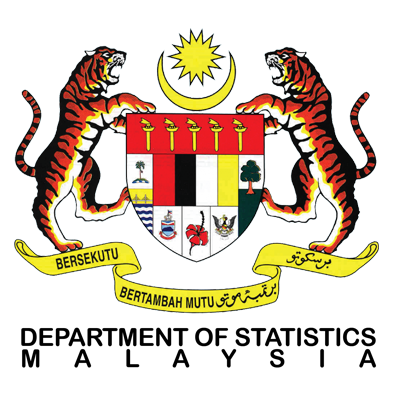Malaysia External Trade Statistics
- Home
- Statistics
- Economy
- External Sector
- Malaysia External Trade Statistics
Malaysia External Trade Statistics August 2019
Malaysia External Trade Statistics July 2019 2 August 2019
Malaysia External Trade Statistics Jun 2019 4 July 2019
Malaysia External Trade Statistics May 2019 3 June 2019
Malaysia External Trade Statistics April 2019 3 May 2019
Malaysia External Trade Statistics March 2019 4 April 2019
Malaysia External Trade Statistics February 2019 Show all release archives
Overview

KEY FACTS
- In August 2019, exports decreased marginally 0.8% to RM81.4 billion year-on-year (y-o-y). Re-exports was valued at RM13.4 billion registering a decline of 0.3% y-o-y and accounted for 16.5% of total exports. Domestic exports also declined 0.8% (-RM581.7 million) to RM67.9 billion.
- Imports registered a decrease of 12.5% y-o-y to RM70.4 billion.
- On a month-on-month (m-o-m) basis, exports declined 7.5% or RM6.6 billion from RM88.0 billion. In seasonally adjusted terms, exports declined 10.5%.
- On a m-o-m basis, imports also recorded a decrease of 4.4% or RM3.2 billion from RM73.7 billion. In seasonally adjusted terms, imports also dropped 4.4%.
- On a y-o-y basis, exports fell due to the decrease in exports to Hong Kong (-RM911.5 million), Singapore (-RM844.9 million), Australia
(-RM818.1 million), Taiwan (-RM690.2 million) and Thailand (-RM382.1 million). - On a y-o-y basis, lower imports were mainly from China (-RM1.9 billion),the European Union (-RM1.6 billion), Singapore (-RM1.6 billion),Taiwan
(-RM1.4 billion) and Saudi Arabia (-RM942.1 million).
TRADE
Total trade which was valued at RM151.8 billion decreased RM10.7 billion or 6.6% as compared to August 2018. It also posted a decrease of RM9.9 billion or 6.1% when compared to the previous month. The trade surplus was RM10.9 billion, soared RM9.5 billion (+655.2%) from a year ago. However, it shrank 23.5% or RM3.4 billion as compared to the previous month.
EXPORTS
On a y-o-y basis, exports decreased 0.8% to RM81.4 billion. The main products which attributed to the decline were:
- Electrical and electronic (E&E) products (36.5% of total exports), dropped RM2.4 billion (-7.4%) to RM29.7 billion;
- Crude petroleum, which contributed 2.4% to total exports fell RM1.3 billion or 40.0% to RM2.0 billion due to the decrease in both export volume (-33.5%) and average unit value (-9.8%); and
- Liquefied natural gas (LNG), which accounted for 3.6% of total exports shrank RM366.6 million or 11.2% to RM2.9 billion due to the decline in average unit value (-13.7%) as export volume grew 2.8%.
However, the following products recorded an increase:
- Palm oil and palm oil-based products (7.3% of total exports), rose RM844.3 million (+16.7%) to RM5.9 billion. Exports of palm oil, the major commodity in this group of products surged RM874.0 million or 31.5% due to the increase in export volume (+54.1%) as average unit value dropped 14.7%;
- Refined petroleum products, which contributed 6.0% to total exports, grew RM349.6 million or 7.7% to RM4.9 billion due to the increase in export volume (+32.9%) as average unit value decreased 19.0%;
- Timber and timber-based products, which contributed 2.5% to total exports, increased RM34.5 million or 1.7% to RM 2.0 billion; and
- Natural rubber, which contributed 0.4% to total exports, rose RM12.6 million or 3.7% to RM349.6 million due to the growth in average unit value (+7.1%) as export volume declined 3.1%.
On a m-o-m basis, exports decreased RM6.6 billion (-7.5%) from RM88.0 billion. The main products which attributed to the decline were:
- E&E products dropped RM6.4 billion (-17.7%) from RM36.0 billion;
- Refined petroleum products declined RM777.8 million or 13.7% from RM5.7 billion due to the decline in average unit value (-16.0%) as export volume rose 2.7%;
- LNG, shrank RM448.2 million (-13.4%) from RM3.3 billion due to the drop in export volume (-15.3%) as average unit value increased 2.2%;
- Crude petroleum, declined RM100.4 million or 4.8% from RM2.1 billion due to the decrease in average unit value (-7.5%) as export volume up 2.9%; and
- Natural rubber decreased RM70.6 million or 16.8% from RM420.2 million due to the decrease in export volume (-16.9%) as average unit value increased marginally 0.2%.
Nevertheless, the following products recorded an increase:
- Palm oil and palm oil-based products, soared RM999.8 million (+20.4%) from RM4.9 billion. Exports of palm oil, expanded RM1.1 billion or 43.7% due to the growth in export volume (+45.4%) as average unit value dropped 1.2%; and
- Timber and timber-based products increased RM74.4 million (+3.8%) from RM1.9 billion.
Exports to Country of Destination
The two major destinations for Malaysia’s exports in August 2019 were China and Singapore. Exports to China amounted RM11.5 billion, declined
RM336.3 million (-2.8%) as compared to the previous year.
The main products which attributed to the decline were:
- E&E products, which contributed 33.6% of total exports dropped RM964.6 million (-20.0%) to RM3.9 billion; and
- Refined petroleum product which contributed 2.8% of total exports reduced RM195.0 million (-38.0%) to RM317.8 million.
Exports to Singapore which were valued at RM10.9 billion declined RM844.9 million (-7.2%). The main products which attributed to the decrease were:
- E&E products, which contributed 44.7% of total exports fell RM812.9 million (-14.3%) to RM4.9 billion; and
- Refined petroleum products (7.9% of total exports), decreased RM545.5 million or 38.8% to RM861.1 million.
Seasonally Adjusted Figure
On a m-o-m basis seasonally adjusted terms, exports decreased RM9.4 billion (-10.5%) to RM79.6 billion.
Exports, 2015-2019

IMPORTS
On a y-o-y basis, imports declined RM10.1 billion or 12.5% to RM70.4 billion. All main categories of imports by end use recorded decreases.
- Intermediate Goods
These goods which constituted 55.4% of total imports fell RM6.3 billion (-13.9%) to RM39.0 billion. The decrease was mainly attributed to industrial supplies, processed (-RM1.9 billion, -10.7%), parts & accessories of capital goods (except transport equipment) (-RM1.8 billion, -12.0%), fuel & lubricants, primary (-RM1.5 billion, -38.0%) and fuel & lubricants, processed, others (-RM1.4 billion, -97.4%). However, industrial supplies, primary increased RM977.8 million or 54.2%.
- Capital Goods
Imports of capital goods, which accounted for 11.4% of total imports, dropped RM3.6 billion (-31.0%) to RM8.1 billion due to the decline in both capital goods (except transport equipment) (-RM2.3 billion, -23.3%) and transport equipment, industrial (-RM1.3 billion, -70.6%).
- Consumption Goods
Imports of consumption goods which constituted 8.8% of total imports recorded a decrease of RM909.8 million (-12.8%) to RM6.2 billion. The decrease was mainly attributed to semi-durables (-RM510.5 million, -30.7%) and durables (-RM474.5 million, -38.4%).
On a m-o-m basis, imports decreased RM3.2 billion or 4.4% from RM73.7 billion. The reduction in imports was attributed to capital goods and consumption goods.
- Capital Goods
Imports of capital goods fell RM359.0 million (-4.3%) from RM8.4 billion due to the decline in both capital good (except transport equipment)(-RM329.6 million, -4.2%) and transport equipment, industrial (-RM29.4 million, -5.0%).
- Consumption Goods
Imports of these goods registered a decrease of RM 142.8 million (-2.2%) from RM6.4 billion. The drop was due to semi-durables (-RM75.3 million, -6.1%), durables (-RM50.9 million, -6.3%) and food & beverages, primary, mainly for household consumption (-RM41.1 million, -4.8%). However,
non-durables recorded an increase of RM33.7 million (+2.1%).
- Intermediate Goods
These goods increased RM123.3 million (+0.3%) from RM38.9 billion. The main component which contributed to the increase was parts & accessories of capital goods (except transport equipment) rose RM4.4 billion or 49.7%. However, the shrank were recorded in fuel & lubricants, processed, others
(-RM2.1 billion, -98.3%) and fuel & lubricants, primary (-RM1.6 billion, -38.9%).
Imports by Country of Origin
The two main sources of Malaysia’s import in August 2019 were China and Singapore. Imports from China which registered RM15.0 billion shrank RM1.9 billion (-11.5%) when compared to August 2018.
The main product which attributed to the decrease was E&E products, which contributed 40.4% of total imports, reduced RM478.8 million or 7.3% to
RM6.1 billion.
Imports from Singapore decreased RM1.6 billion (-18.1%) to RM7.2 billion from a year ago. The main products which attributed to the drop were:
- Refined petroleum products (25.7% of total imports), decreased RM1.0 billion or 35.3% to RM1.8 bllion; and
- E&E products, which contributed 31.7% of total imports fell RM709.1 million (-23.8%) to RM2.3 billion.
Seasonally Adjusted Figure
On a m-o-m basis seasonally adjusted terms, imports shrank RM3.2 billion (-4.4%) to RM68.8 billion.
Imports, 2015-2019

MARKET SHARE
The following charts show Malaysia's major trading partners for January – August 2019.
Total Trade by Major Countries, Jan – Aug 2019, percentage share

Exports and Imports by Major Countries, Jan – Aug 2019, percentage share
.png)
The following charts show Malaysia’s trade with ASEAN countries for the period January - August 2019.
Exports, Jan – Aug 2019, percentage share
.png)
Imports, Jan – Aug 2019, percentage share

#Notes:
1. The August 2019 data is provisional and subject to revision in later issues.
2. This report can be accessed through the web portal of the Department of Statistics, Malaysia (https://www.dosm.gov.my) under section: Latest Release.
Released By:
DATO' SRI DR. MOHD UZIR MAHIDIN
CHIEF STATISTICIAN MALAYSIA
DEPARTMENT OF STATISTICS, MALAYSIA
![]() DrUzir_Mahidin
DrUzir_Mahidin ![]()
![]() Dr_Uzir
Dr_Uzir
4 OCTOBER 2019
Contact person:
Rohaida binti Mohamad
Public Relation Officer
Strategic Communication and International Division
Department of Statistics, Malaysia
Tel : +603-8885 7942
Fax : +603-8888 9248
Email : rohaida.mohamad[at]dosm.gov.my
Subscribe
Newsletter
Subscribe to our newsletter and stay updated
For interviews, press statement and clarification to the media, contact:
Baharudin Mohamad
Public Relation Officer
Email: baharudin[at]dosm.gov.my
Phone: 03 8090 4681
Not found what you looking for? Request data from us, through
Go to eStatistik
Email: data[at]dosm.gov.my
Phone: 03 8885 7128 (data request)










